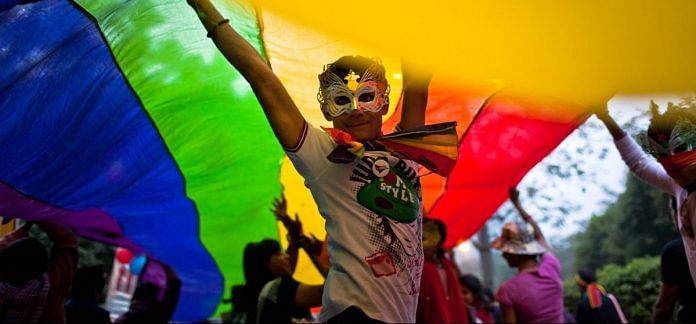The constitution bench is due to hear two pleas filed by six prominent personalities challenging Section 377.
New Delhi: A constitution bench of the Supreme Court will begin hearing Tuesday a batch of appeals challenging the validity of Section 377 of the Indian Penal Code criminalising gay sex.
Emboldened by the historic apex court judgment that declared privacy as a fundamental right in 2017, celebrities and prominent personalities filed a batch of pleas seeking to assert their right and choice of sexual orientation.
Sangeet Natak Akademi Award-winning Bharatnatyam dancer Navtej Singh Johar, journalist Sunil Mehra, chef Ritu Dalmia, business executive Ayesha Kapur, and Neemrana Hotels co-founder Aman Nath filed a plea in June 2016, seeking to quash the Colonial-era law. On 23 April, hotelier Keshav Suri joined the five celebrities to file another plea.
Hearing the plea by the five petitioners on 8 January, the court referred the matter to a constitution bench.
Right to privacy
The debate to decriminalise homosexuality got a shot in the arm when the apex court unanimously declared privacy as a fundamental right on 25 August 2017.
The apex court in its privacy judgment held that “discrimination against an individual on the basis of sexual orientation is deeply offensive to the dignity and self-worth of the individual. Equality demands that the sexual orientation of each individual in society must be protected on an even platform”.
“That a minuscule fraction of the country’s population constitutes lesbians, gays, bisexuals or transgenders (as observed in the judgment of this Court) is not a sustainable basis to deny the right to privacy,” the 2017 judgment on privacy read.
“Their rights are not ‘so-called’ but are real rights founded on sound constitutional doctrine. They inhere in the right to life. They dwell in privacy and dignity. They constitute the essence of liberty and freedom. Sexual orientation is an essential component of identity. Equal protection demands protection of the identity of every individual without discrimination,” the nine-judge bench had said.
Changing mores of the society
Societal morality changes with time and the law should change pace with life, the Supreme Court observed while referring the plea in January. A section of society must not live in a state of fear simply because of the choices they make, Chief Justice of India Dipak Misra had observed.
Referring to its December 2013 verdict that overturned the 2009 Delhi high court order that decriminalised gay sex, the apex court admitted that its decision needed to be reconsidered and referred the matter to a larger bench.
The top court relied on the privacy judgment that observed “sexual orientation is an essential attribute of privacy” to reaffirm its positive attitude towards the LGBTQ community.
“Section 377 IPC uses the phraseology “carnal intercourse against the order of nature”. The determination of order of nature is not a constant phenomenon. Social morality also changes from age to age. The law copes with life and accordingly change takes place,” the apex court observed.
The bench further added: “What is natural to one may not be natural to the other but the said natural orientation and choice cannot be allowed to cross the boundaries of law and as the confines of law cannot tamper or curtail the inherent right embedded in an individual under Article 21 of the Constitution.”
Batch of pleas
There are two batches of pleas challenging gay sex that are pending in the top court. The first one, a curative petition challenging the December 2013 verdict of the apex court, filed by NGO Naz Foundation is still pending in the court. The other plea in this case is the batch of appeals filed by the six noted personalities.
“Section 377 of the IPC criminalises a core part of a person’s identity solely on account of his or her sexuality and thus violates Article 21 of the Constitution. Section 377 IPC denies LGBT persons their rights to full personhood, sexuality, sexual autonomy, and choice of sexual partner, which are implicit in the notion of life under Article 21 of the Constitution of India. This Hon’ble Court has upheld the right to choice of conjugal partner under Article 21 of the Constitution of India,” the first plea, filed by the five personalities, read.
Senior advocate Arvind Datar, representing the five, argued that while the Naz Foundation was fighting for a larger cause, he was for those whose fundamental rights are directly affected by Section 377.
“Right to choose my partner is part of my fundamental right to privacy,” Datar had submitted.




Normally, an issue of this nature ought to have been decided by Parliament, keeping India in harmony with changing mores all over the world. Unfortunately, that will not happen. As ever, the apex court should rise to the occasion. Its judgment on privacy being a fundamental right leads in this direction as well.